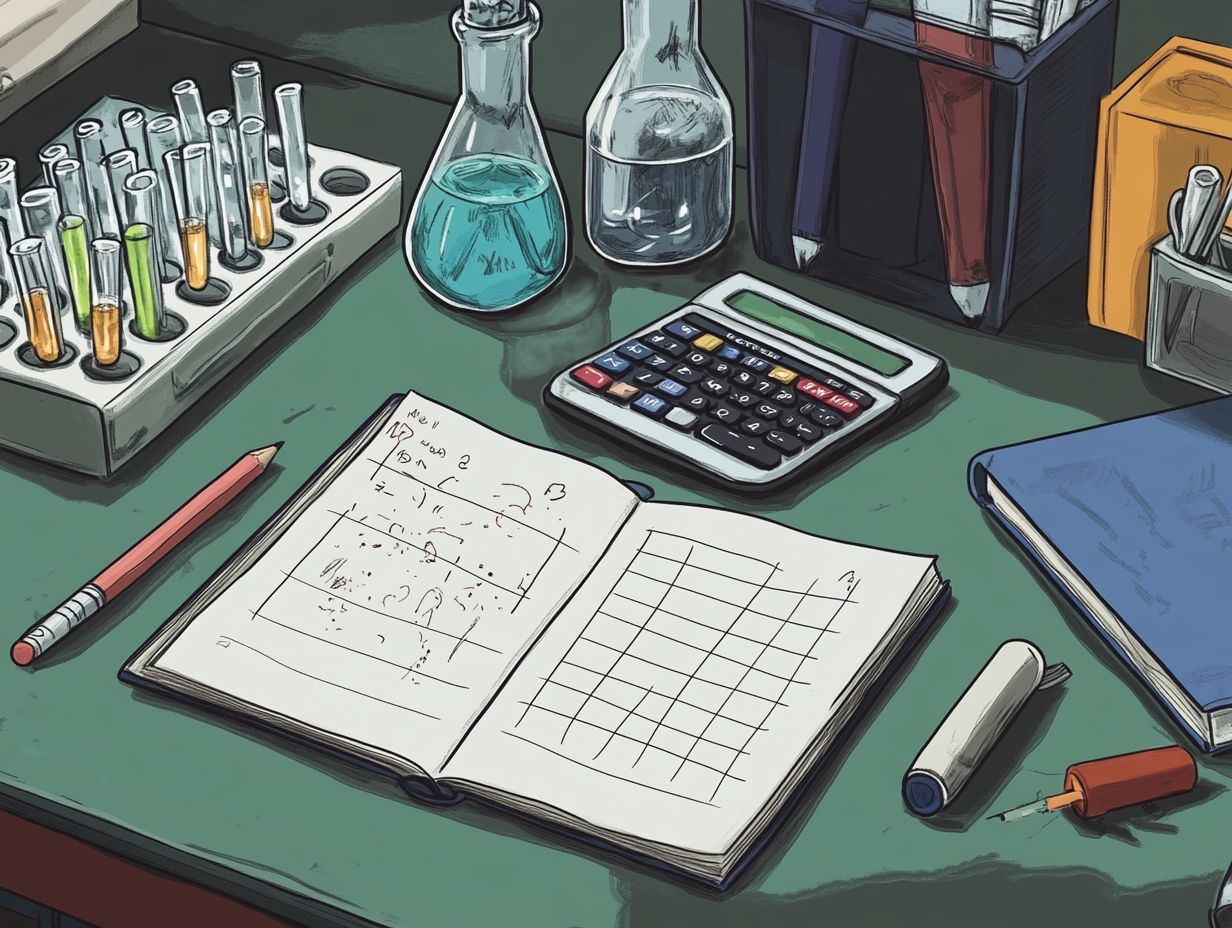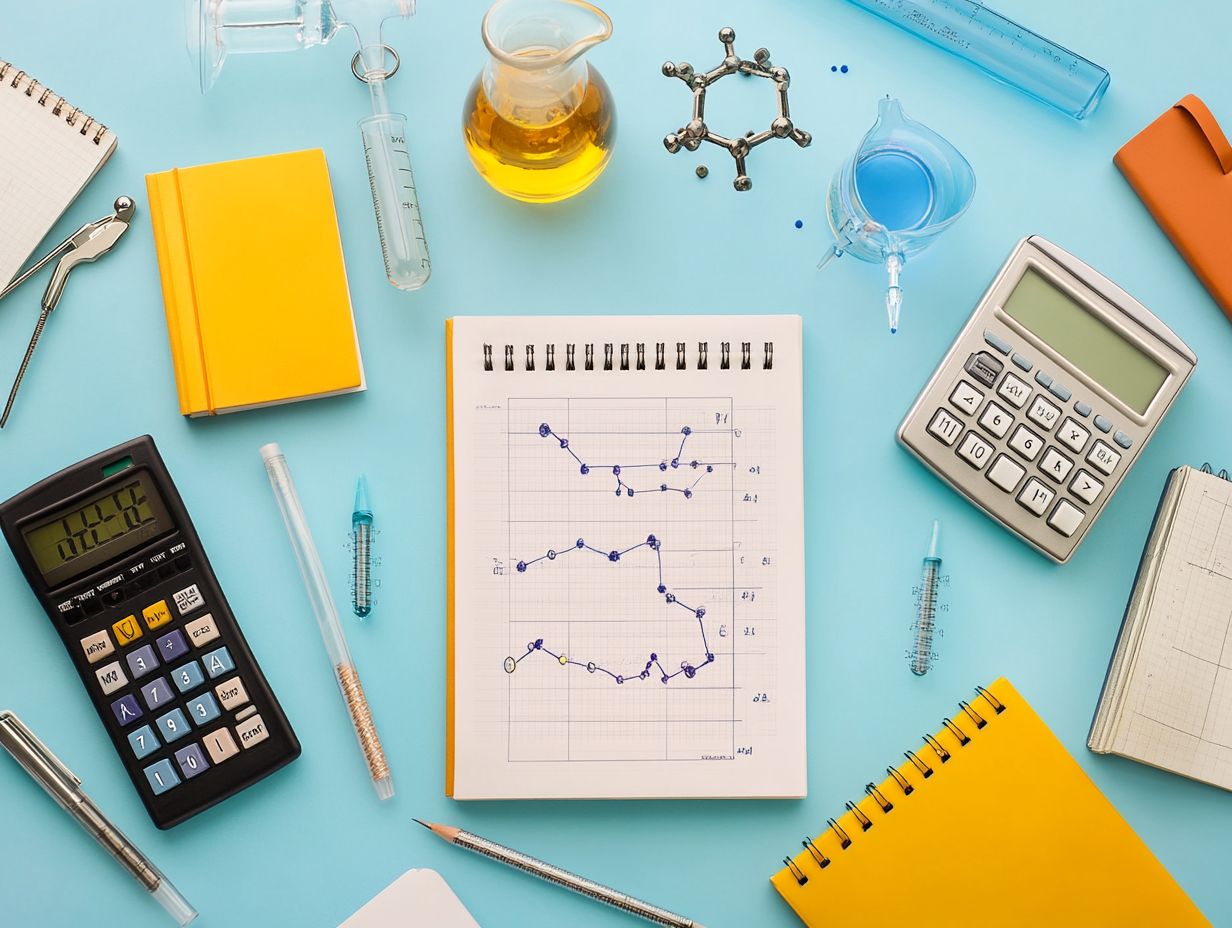sat subject test in chemistry: a breakdown
The SAT Subject Test in Chemistry is a great chance to show your knowledge of the subject. It also reflects your enthusiasm for chemistry.
Whether your goal is to enhance your college applications or assess your chemistry skill level, this test can significantly influence your academic trajectory.
This article provides crucial insights into the test format and strategies to help you score high. Get ready to unlock your full potential on test day!
Contents
- Key Takeaways:
- Overview of the SAT Subject Test in Chemistry
- Format and Content of the Test
- How to Prepare for the Test
- Scoring and Score Reporting
- Sending Scores to Colleges
- Tips for Success on Test Day
- Frequently Asked Questions
- What is the SAT Subject Test in Chemistry?
- What topics are covered on the SAT Subject Test in Chemistry?
- What is the format of the SAT Subject Test in Chemistry?
- How is the SAT Subject Test in Chemistry scored?
- When should I take the SAT Subject Test in Chemistry?
- Do all colleges require the SAT Subject Test in Chemistry?
Key Takeaways:

The SAT Subject Test in Chemistry is a standardized exam that assesses a student’s knowledge and understanding of chemistry concepts.
Taking the SAT Subject Test in Chemistry can demonstrate a student’s skill level in the subject and potentially improve their college applications.
Proper preparation, including utilizing study resources and employing test-taking strategies, can help students achieve a higher score on the SAT Subject Test in Chemistry.
Overview of the SAT Subject Test in Chemistry
The SAT Subject Test in Chemistry, offered by the College Board, serves as a standardized assessment crafted to evaluate your knowledge and skills in chemistry a crucial subject for anyone looking to pursue a college education in science and related fields.
This exam tests more than just your knowledge of chemistry concepts; it plays a significant role in the college admission process, allowing you to highlight your academic strengths, especially in the sciences.
With a wealth of topics to explore, practice materials at your disposal, and effective preparation strategies to implement, you can elevate your test performance and enhance your prospects for college admissions.
What is the SAT Subject Test in Chemistry?
The SAT Subject Test in Chemistry is a standardized assessment designed to evaluate your understanding of essential chemistry principles, encompassing a range of topics vital to the field. This examination serves not only as a benchmark for you to showcase your knowledge but also as a way to demonstrate your readiness for advanced coursework in college.
You can expect the test to be structured around multiple-choice questions that delve into key areas such as the periodic table, stoichiometry (the calculation of reactants and products in chemical reactions), thermochemistry, and chemical bonding.
As you prepare, anticipate questions that will assess your ability to interpret data, solve quantitative problems, and apply concepts to real-world scenarios. Familiarity with laboratory practices and an understanding of chemical reactions will be crucial, as these elements reflect the practical applications of chemistry that are essential for your success in higher education.
Why Take the Test?
Taking the SAT Subject Test in Chemistry can significantly elevate your college application, demonstrating your skill level in a core science subject while aligning with your academic interests and strengths.
This not only highlights a solid foundation in chemistry but also showcases your dedication to mastering challenging material precisely what admissions committees are looking for. Prestigious institutions like Harvard and Stanford view these scores as a testament to your readiness for demanding coursework.
By choosing to take the SAT Subject Test, you can craft a compelling narrative of your academic journey, encapsulating your passion for science in a way that distinguishes you from the competition. Solid scores can indicate your potential to excel in related majors, further bolstering your overall application.
Format and Content of the Test
The SAT Subject Test in Chemistry presents a meticulously crafted format that effectively evaluates a comprehensive array of topics within the discipline.
It features multiple-choice questions designed to assess not only your content knowledge but also the analytical skills essential for success in chemistry and related fields.
This approach ensures a thorough understanding of the subject while preparing you for future academic pursuits.
Structure and Timing

The SAT Subject Test in Chemistry features a carefully structured series of multiple-choice questions that you ll need to tackle within a strict time limit, providing you an opportunity to showcase your proficiency efficiently.
Generally, you can expect around 85 questions, thoughtfully organized across essential chemistry topics like atomic structure, states of matter, and thermodynamics.
Each section probes different facets of your understanding and application, challenging you to think critically while racing against the clock.
It’s vital to manage your time wisely. Striking a balance between speed and accuracy is key because a hasty approach can lead to careless mistakes.
Develop effective test-taking strategies. Focus on easier questions first, and practice pacing with timed exams.
These techniques can make a significant difference in how you navigate the test and achieve the score you aim for.
Topics Covered
The SAT Subject Test in Chemistry encompasses a wide array of topics, including essential concepts like atomic structure, chemical reactions, and the properties of matter, offering a thorough evaluation of your chemistry knowledge.
You will also learn about stoichiometry, which looks at how substances react and change in chemical reactions, underscoring the importance of quantitative measurements.
The curriculum places a strong emphasis on thermodynamics, allowing you to grasp the principles that govern energy transfers and the spontaneity of chemical processes.
Chemical equilibrium is explored in depth, illustrating how dynamic processes reach a balance and how various factors can influence this state.
By engaging with these topics, not only will you prepare for college-level coursework, but you’ll also sharpen your analytical skills an essential asset for success in any scientific endeavor.
How to Prepare for the Test
Preparing for the SAT Subject Test in Chemistry is essential! It requires a mix of study resources and strategies to ensure you re ready to shine.
Study Resources and Strategies
Get ready! A treasure trove of study resources is at your fingertips as you prepare for the SAT Subject Test in Chemistry. From textbooks and online platforms to practice tests, you ll find everything you need to reinforce your grasp of key concepts.
Take, for example, the popular textbook “Chemistry: The Central Science” by Brown et al., which offers comprehensive coverage of essential topics. Websites like Khan Academy provide engaging video tutorials and practice exercises tailored to different learning styles.
And don t overlook mobile apps like Quizlet, which allow you to study on the go with flashcards and practice quizzes. Diagnostic tests can be particularly valuable, helping you identify specific areas where you may need improvement.
This way, you can focus your study sessions more effectively, enhancing both your performance and retention of the material. By customizing your approach to these diverse resources, you can efficiently consolidate your knowledge and build the confidence you need for exam day.
Scoring and Score Reporting
Grasping the intricacies of the SAT Subject Test scoring in Chemistry is essential for students. This understanding not only offers valuable insights into their performance but also plays a pivotal role in shaping college admissions decisions.
Understanding Your Score

Understanding your SAT Subject Test scores is crucial. They show how well you know the material and highlight areas for improvement.
These scores offer valuable insights into how you stack up against your peers, highlighted by percentile rankings. For example, if you find yourself in the 90th percentile, that means you’ve outperformed 90 percent of test-takers, demonstrating a robust understanding of the subject matter.
It’s essential to look beyond just the overall score; breaking down your performance into specific categories can be incredibly beneficial. This includes identifying your strengths in particular topics or sections.
By evaluating these aspects, you can strategically direct your study efforts toward weaker areas, ensuring a more balanced and effective preparation for future assessments or academic endeavors.
Sending Scores to Colleges
You can report your SAT Subject Test in Chemistry scores to colleges as part of your application. This ensures that admissions officers have a comprehensive view of your academic capabilities.
Submitting these scores is a smart strategy, especially if you ve achieved strong results! It can enhance your overall application profile.
You must keep track of important deadlines. Most colleges require scores to be sent by specific dates for consideration in the admission process.
Carefully consider whether to submit all scores or just the highest. Certain schools allow you to choose which scores to report. Evaluating these factors can significantly influence how your application is perceived, especially in competitive programs where your test performance might be the deciding factor in your favor.
Tips for Success on Test Day
To maximize your performance on test day for the SAT Subject Test in Chemistry, use effective study methods designed to reduce anxiety and ensure a smooth testing experience.
Test-Taking Strategies
Effective test-taking strategies for the SAT Subject Test in Chemistry can elevate your ability to answer questions accurately and within the time limits.
By focusing on essential techniques, you can navigate the exam confidently. For instance, pay close attention to the wording of each question to understand what is being asked and pinpoint the most relevant information.
Master the skill of eliminating clearly incorrect answer choices to enhance your chances of selecting the right one. Time management is equally crucial! Allocate specific minutes for each question to avoid a last-minute scramble and ensure every section gets the attention it deserves.
These strategies sharpen your test-taking skills and pave the way for a more favorable outcome on exam day.
What to Bring and What to Expect
On the day of the SAT Subject Test in Chemistry, be thoroughly prepared by knowing what materials to bring and what to expect during the testing experience.
Your preparation begins with gathering essential items, including a valid photo ID this could be your driver’s license or school ID along with the admission ticket that confirms your registration. It s crucial to have the right writing tools on hand, like number 2 pencils, an eraser, and a permitted calculator if needed.
Expect a spacious room filled with rows of desks monitored by proctors. This setup keeps distractions away so you can focus!
Frequently Asked Questions

What is the SAT Subject Test in Chemistry?
The SAT Subject Test in Chemistry is a standardized test, meaning it is the same for all students, making it fair for everyone. It assesses a student’s knowledge and understanding of chemistry and is used by colleges and universities as part of their admissions process.
What topics are covered on the SAT Subject Test in Chemistry?
The test covers a wide range of chemistry topics, including general chemistry, organic chemistry, and laboratory skills. You can find a detailed breakdown of topics on the College Board’s website.
What is the format of the SAT Subject Test in Chemistry?
The test is a one-hour, multiple-choice exam consisting of 85 questions. The questions fall into three main areas: general chemistry, organic chemistry, and laboratory skills. Calculators are not allowed on this test.
How is the SAT Subject Test in Chemistry scored?
The test is scored on a scale of 200-800, with 200 being the lowest score and 800 the highest. Each correct answer is worth one point, and each wrong answer results in a 0.25 point deduction. No points are deducted for unanswered questions.
When should I take the SAT Subject Test in Chemistry?
The test is offered six times a year, usually in October, November, December, May, June, and August. It is recommended to take the test in the spring of your junior year or the fall of your senior year, as this allows you enough time to retake the test if needed.
Start preparing today to ace your SAT Subject Test in Chemistry!
Do all colleges require the SAT Subject Test in Chemistry?
Not all colleges and universities require the SAT Subject Test in Chemistry. Many competitive schools, especially those with strong science programs, recommend or require this test.
Find out what each school needs to boost your chances of getting in! Research their requirements today.






